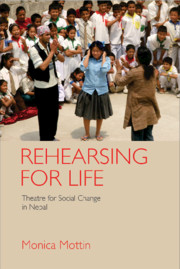Book contents
- Frontmatter
- Dedication
- Contents
- List of Tables, Figures and Boxes
- Acknowledgements
- Chapter 1 Theatre and Life: Theatre at the intersection of art, politics and international development
- Chapter 2 Spacing Out to Speak Up: Resistance, protest and the emergence of street theatre
- Chapter 3 The Streets Become the Stage: Performance, protest and theatre in a time of political crisis
- Chapter 4 Kachahari Natak: Fragments of an aesthetics of theatre for social change
- Chapter 5 Activism not Development Work: Explorations in Tharu kachahari natak
- Chapter 6 A Cultural Army for a Cultural Revolution: Maoist cultural programmes and revolutionary theatre
- Chapter 7 The Ordinariness of the Special: Towards the professionalization of theatre work
- Chapter 8 Conclusions
- Bibliography
- Index
Chapter 2 - Spacing Out to Speak Up: Resistance, protest and the emergence of street theatre
Published online by Cambridge University Press: 05 April 2018
- Frontmatter
- Dedication
- Contents
- List of Tables, Figures and Boxes
- Acknowledgements
- Chapter 1 Theatre and Life: Theatre at the intersection of art, politics and international development
- Chapter 2 Spacing Out to Speak Up: Resistance, protest and the emergence of street theatre
- Chapter 3 The Streets Become the Stage: Performance, protest and theatre in a time of political crisis
- Chapter 4 Kachahari Natak: Fragments of an aesthetics of theatre for social change
- Chapter 5 Activism not Development Work: Explorations in Tharu kachahari natak
- Chapter 6 A Cultural Army for a Cultural Revolution: Maoist cultural programmes and revolutionary theatre
- Chapter 7 The Ordinariness of the Special: Towards the professionalization of theatre work
- Chapter 8 Conclusions
- Bibliography
- Index
Summary
Universes of worlds as well as worlds themselves may be built in many different ways.
(Goodman, 1978,5)Listen to other people's opinions about the king but never tell yours.
(Identity withdrawn, Kathmandu, 4 February 2005)On the first of February 2005, around 10.15 a.m., I stopped by a shop on the way back to Gurukul after a Nepali language class. The king was speaking on the radio: prajatantra, ‘democracy’, was a word he uttered repeatedly. Customers and shopkeepers were listening in silence. I did my shopping quickly and left. In the Gurukul courtyard, Sunil was listening attentively to the radio sitting on a chair under the thatched wooden gazebo. The atmosphere was thick with tension, different from the cheerfulness that had filled the air a couple of hours earlier. Some of the artists were sitting near Sunil. ‘It is finished’ – said one of them with despair – ‘our fight for democracy in 1990 was useless.’
In fact, at 10 a.m., King Gyanendra used the government-run media, Radio Nepal and Nepal TV, to declare a state of emergency under the Constitution of the Kingdom of Nepal 1990, Article 23(7) on the grounds that ‘a serious crisis had arisen threatening the kingdom's integrity and security’. He suspended the right of freedom of expression, assembly and movement, press and publication rights, rights against preventive detention, the right to information, the right to property, the right to privacy, the right to constitutional remedy, and formed a council of ministers under his own chairmanship. During his 40 minute proclamation to the nation, Gyanendra severely criticized the political parties for their inability to solve the Maoist conflict and hold elections. Legitimizing his actions through the history of the Shah dynasty and referring to the age-long bond between the king and the Nepali people, he promised to restore multi-party democracy within three years.
Soon after the king's speech, land and mobile phone lines – both local and international – as well as the internet service were cut. The valley remained in total isolation for seven days. Tribhuvan International Airport was closed and the security forces blocked the main roads leading out of the valley.
- Type
- Chapter
- Information
- Rehearsing for LifeTheatre for Social Change in Nepal, pp. 32 - 65Publisher: Cambridge University PressPrint publication year: 2017



